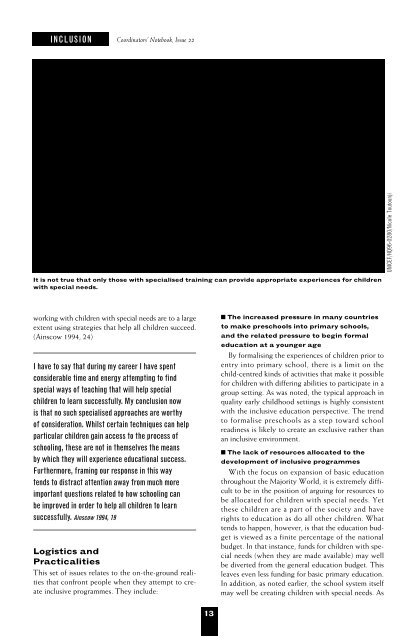Inclusive ECCD: - Consultative Group on Early Childhood Care and ...
Inclusive ECCD: - Consultative Group on Early Childhood Care and ...
Inclusive ECCD: - Consultative Group on Early Childhood Care and ...
You also want an ePaper? Increase the reach of your titles
YUMPU automatically turns print PDFs into web optimized ePapers that Google loves.
INCLUSION Coordinators’ Notebook, Issue 22<br />
UNICEF/HQ96-0280/Nicole Toutounji<br />
It is not true that <strong>on</strong>ly those with specialised training can provide appropriate experiences for children<br />
with special needs.<br />
working with children with special needs are to a large<br />
extent using strategies that help all children succeed.<br />
(Ainscow 1994, 24)<br />
I have to say that during my career I have spent<br />
c<strong>on</strong>siderable time <strong>and</strong> energy attempting to find<br />
special ways of teaching that will help special<br />
children to learn successfully. My c<strong>on</strong>clusi<strong>on</strong> now<br />
is that no such specialised approaches are worthy<br />
of c<strong>on</strong>siderati<strong>on</strong>. Whilst certain techniques can help<br />
particular children gain access to the process of<br />
schooling, these are not in themselves the means<br />
by which they will experience educati<strong>on</strong>al success.<br />
Furthermore, framing our resp<strong>on</strong>se in this way<br />
tends to distract attenti<strong>on</strong> away from much more<br />
important questi<strong>on</strong>s related to how schooling can<br />
be improved in order to help all children to learn<br />
successfully. Ainscow 1994, 19<br />
Logistics <strong>and</strong><br />
Practicalities<br />
This set of issues relates to the <strong>on</strong>-the-ground realities<br />
that c<strong>on</strong>fr<strong>on</strong>t people when they attempt to create<br />
inclusive programmes. They include:<br />
■ The increased pressure in many countries<br />
to make preschools into primary schools,<br />
<strong>and</strong> the related pressure to begin formal<br />
educati<strong>on</strong> at a younger age<br />
By formalising the experiences of children prior to<br />
entry into primary school, there is a limit <strong>on</strong> the<br />
child-centred kinds of activities that make it possible<br />
for children with differing abilities to participate in a<br />
group setting. As was noted, the typical approach in<br />
quality early childhood settings is highly c<strong>on</strong>sistent<br />
with the inclusive educati<strong>on</strong> perspective. The trend<br />
to formalise preschools as a step toward school<br />
readiness is likely to create an exclusive rather than<br />
an inclusive envir<strong>on</strong>ment.<br />
■ The lack of resources allocated to the<br />
development of inclusive programmes<br />
With the focus <strong>on</strong> expansi<strong>on</strong> of basic educati<strong>on</strong><br />
throughout the Majority World, it is extremely difficult<br />
to be in the positi<strong>on</strong> of arguing for resources to<br />
be allocated for children with special needs. Yet<br />
these children are a part of the society <strong>and</strong> have<br />
rights to educati<strong>on</strong> as do all other children. What<br />
tends to happen, however, is that the educati<strong>on</strong> budget<br />
is viewed as a finite percentage of the nati<strong>on</strong>al<br />
budget. In that instance, funds for children with special<br />
needs (when they are made available) may well<br />
be diverted from the general educati<strong>on</strong> budget. This<br />
leaves even less funding for basic primary educati<strong>on</strong>.<br />
In additi<strong>on</strong>, as noted earlier, the school system itself<br />
may well be creating children with special needs. As<br />
13
















